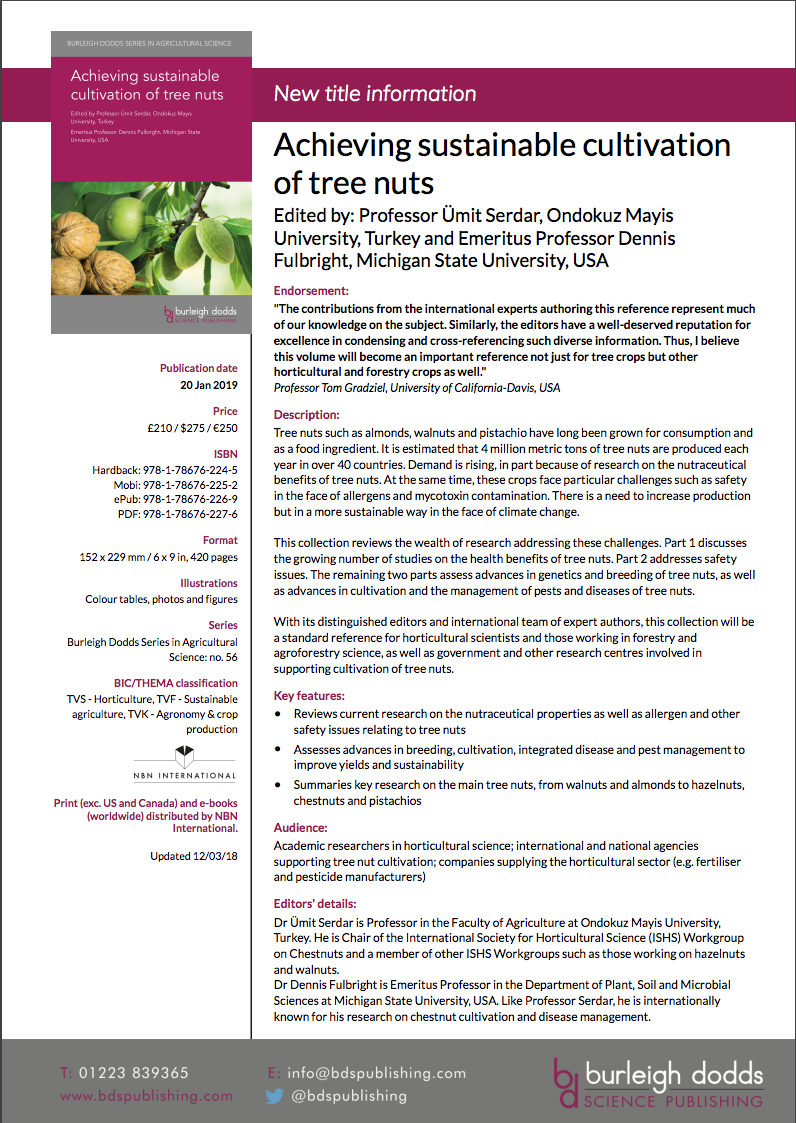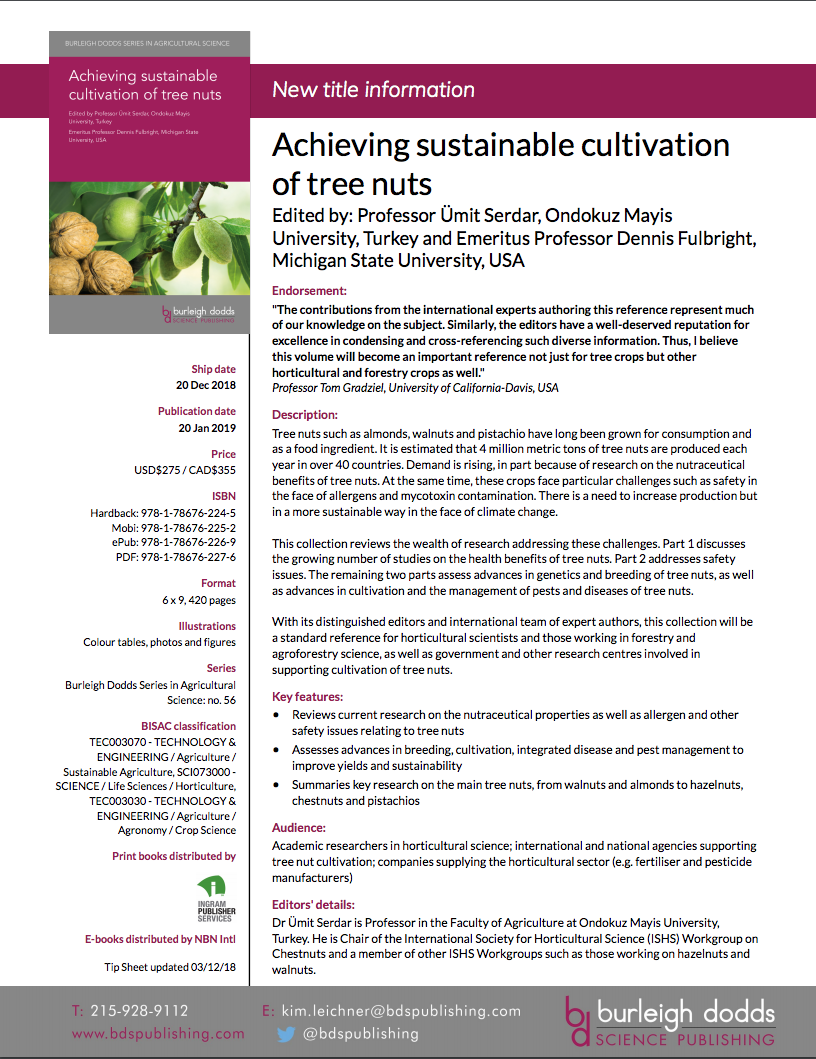Burleigh Dodds Science Publishing are just three years old, but the founders come from rich stock, being former directors at Woodhead Publishing. Burleigh Dodds use ‘smart-publishing’ to help achieve ‘climate-smart’ agriculture. As Editorial Director Francis Dodds says:
It is widely recognised that agriculture is a significant contributor to global warming and climate change. It has been estimated that agriculture is responsible for 10-12% of greenhouse gas emissions. Agriculture needs to reduce its environmental impact and adapt to current climate change whilst still feeding a growing population.
Consonance partnered with Burleigh Dodds to provide specific metadata management features that have underpinned their ability to deliver this important content via a new publishing model. And we’re particularly excited to share our story now, because Burleigh Dodds have just won the Nick Robinson Newcomer Award at the IPG Awards 2018.
Congratulations to @bdspublishing, winner of the 2018 Nick Robinson Newcomer Award #ipgsc #ipgawards2018 pic.twitter.com/v3p6lwDLP9
— IPG (@ipghq) March 9, 2018
The vision
We first met Rob Burleigh in the John Lewis cafe in Milton Keynes – a suitably central meeting point for our two companies, based in Oxford and Cambridge respectively. At that meeting, Rob sketched out on the back of a napkin his vision for the metadata management environment for his newly-founded company.
Experts in their field would be invited to be series and book editors. The books would contain contributions from further experts, sometimes up to 40 chapters’ worth. And Burleigh Dodds’ key point of difference? The ability to manage each of the chapters as its own work.
As chapters were delivered and edited, Burleigh Dodds would publish them as standalone ebooks, delivering the time-sensitive subject matter to the readership as soon as possible. When all the chapters were delivered, Burleigh Dodds would publish one large combined work, derived from all the chapters and linked in the metadata system, in hardback and ebook, with the option of combining chapters in multiple ways in the future to create new products with a different main focus.
Consonance would need to accommodate this complex work derivation model in order to help. And we did want to help, because it was evident that Burleigh Dodds were going to be changing the world for the better in more than one way, and we wanted to be part of that story.
The development
Armed with the napkin, and full of enthusiasm for a new enhancement to Consonance which we felt would help not only Burleigh Dodds but other clients with multi-layered work relationships, we established a formal development project. This project did the following:
- Designed the underlying system architecture to relate works to each other.
- Designed the UX: users create an original work at any level of the hierarchy, which can then be used as the basis for a derived work, or be the parent work.
- Allowed metadata on the combined works to be derived automatically from the chapters, saving tedious and error-prone manual data entry for long contributor lists and tables of contents.
- Planned the enhancements to the ONIX feeds to select partners able to ingest and interpret this part of the ONIX standard.
- Communicated with Rob at Burleigh Dodds to iterate on our plan, to ensure it was meeting his strategic needs.
- Developed and tested the code to deliver the new feature.
The commercial side
We also confirmed back to Burleigh Dodds that our pricing model would not penalise them. In practice, the derived work approach meant that on day one
, Burleigh Dodds had thousands of products in Consonance, although from a traditional publishing point of view they only had around 15 main works. Other bibliographic systems that charge by the product made it impossibly expensive. Our more
flexible approach of pricing by the user meant that Burleigh Dodds could have thousands of products in the system, for £55 / user / month.
The result
In short order, Burleigh Dodds were able to store their works at a much richer level than previously possible. As well as the new derived work functionality, they immediately understood the importance of rich metadata. They also chose their distributor very wisely. We find Plymouth-based NBN International to be by far the best UK distributor and are able to ingest our enhanced ONIX feed without a hitch, which includes:
- Related products
- Derived works
- Multi-part tables of contents, automatically generated in Consonance from the derived work associations and structured in valid XHTML
- Multiple, ordered Thema, BIC and BISAC codes
- Multiple contributor associations: helpful when some of the derived works had upwards of eighty contributors
- Marketing texts, multi-currency pricing
- Non-trade products having no ISBN
As a bonus: market-specific AIs
We also developed two market-specific AIs, incorporating amongst other variances different publication dates for North America and the UK and Europe. Perhaps you can spot the differences: they are both produced from the same source data that forms the ONIX feeds. Consonance generates exports in the right format for the recipient, whether they are a computer or a retail buyer.


Conclusion: strategic feature development without breaking the bank
We were honoured to develop this new functionality, at no cost to the client, to fuel Burleigh Dodds’ innovative publishing approach based on the provision of excellent, rich, deep and automatically generated structured metadata. And hearty congratulations to them for winning the Newcomer of the Year IPG award: as close partners we are able to say it is richly deserved.

Are your current systems sabotaging your growth ambitions? Are you hungry to implement new business models, but concerned you lack the strong administrative foundations needed for innovation?
We're always amazed at how resigned publishers have had to become to the low bar in publishing management systems. Demand more.
Contact us via our contact form, or email us.